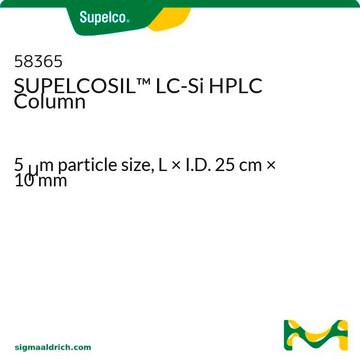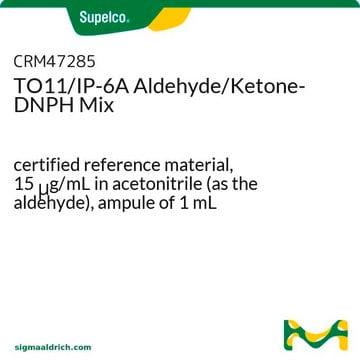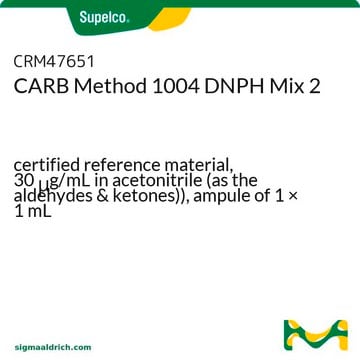53826-U
Ascentis® Express 90 Å C18 (2.7 μm) HPLC Columns
L × I.D. 5 cm × 4.6 mm, HPLC Column
Synonym(s):
Core-shell (SPP) Fused Core C18 HPLC column
About This Item
Recommended Products
product name
Ascentis® Express C18, 2.7 μm HPLC Column, 2.7 μm particle size, L × I.D. 5 cm × 4.6 mm
material
stainless steel column
Quality Level
Agency
suitable for USP L1
product line
Ascentis®
feature
endcapped
manufacturer/tradename
Ascentis®
packaging
1 ea of
parameter
60 °C temp. range
600 bar max. pressure (9000 psi)
technique(s)
HPLC: suitable
LC/MS: suitable
UHPLC-MS: suitable
UHPLC: suitable
L × I.D.
5 cm × 4.6 mm
surface area
135 m2/g
impurities
<5 ppm metals
matrix
Fused-Core particle platform
superficially porous particle
matrix active group
C18 (octadecyl) phase
particle size
2.7 μm
pore size
90 Å
operating pH
2-9
application(s)
food and beverages
separation technique
reversed phase
Looking for similar products? Visit Product Comparison Guide
Related Categories
General description
Visit the Ascentis Express home page for more information on this new column technology.
Application
Legal Information
Application
guard cartridge
related product
Choose from one of the most recent versions:
Certificates of Analysis (COA)
Don't see the Right Version?
If you require a particular version, you can look up a specific certificate by the Lot or Batch number.
Already Own This Product?
Find documentation for the products that you have recently purchased in the Document Library.
Customers Also Viewed
Articles
Carbonyl compounds react within the DNPH cartridge to form immobilized hydrazones, which can be subjected to automated desorption and HPLC analysis with UV detection.
Carbonyl compounds react within the DNPH cartridge to form immobilized hydrazones, which can be subjected to automated desorption and HPLC analysis with UV detection.
Carbonyl compounds react within the DNPH cartridge to form immobilized hydrazones, which can be subjected to automated desorption and HPLC analysis with UV detection.
Carbonyl compounds react within the DNPH cartridge to form immobilized hydrazones, which can be subjected to automated desorption and HPLC analysis with UV detection.
Related Content
Accurately detect and quantify trace nitrosamines (NDMA, NDEA, NEIPA, NDIPA, NDBA, etc.) in pharmaceutical drugs using our complete product portfolio and application guides for LC-MS and GC-MS. Order high-quality reference standards, columns, filters & more.
Accurately detect and quantify trace nitrosamines (NDMA, NDEA, NEIPA, NDIPA, NDBA, etc.) in pharmaceutical drugs using our complete product portfolio and application guides for LC-MS and GC-MS. Order high-quality reference standards, columns, filters & more.
Chromatograms
application for HPLC, application for SPEapplication for HPLCapplication for HPLC, application for SPEapplication for HPLCOur team of scientists has experience in all areas of research including Life Science, Material Science, Chemical Synthesis, Chromatography, Analytical and many others.
Contact Technical Service













